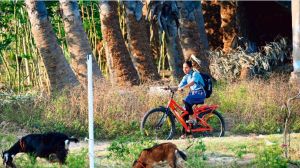Stay updated with the latest - Click here to follow us on Instagram
State gets its first draft on action plan for clean,renewable energy
Even as the Union government is set to make a giant move to avert climate change by launching the National Solar Mission on November 14...
Even as the Union government is set to make a giant move to avert climate change by launching the National Solar Mission on November 14,Maharashtra took its first step on Monday towards clean,renewable energy as Pune-based NGO World Institute of Sustainable Energy (WISE) presented its draft Action Plan for Clean Energy Technology for Climate Change for Maharashtra in a workshop .
According to the draft,the action plan will be carried out in three phases: upto 2012 (short term),2012-2020 (medium term),2020-2030 (long term).
It made preliminary estimations that Maharashtra has the potential to develop grid-connected renewable power projects in the range of 35,185 MW to 1,36,709 MW,based on different assumptions. Wind power alone can contribute upwards of 14,260 MW to 23,140 MW.
The workshop was part of a national project funded by the UK Foreign and Commonwealth Office and supported by the British High Commission and brought together dignitaries,including V P Raja,chairman,Maharashtra Electricity Regulatory Commission,Vicki Treadell,deputy High Commissioner,British Deputy High Commission,S R Chaudhari,general manager of Maharashtra Energy Development Agency and Sanjeev Ghotge,senior Fellow and Project Coordinator of WISE.
The draft proposal
* Analyses of the status,prospects and options required for changes in energy production and consumption patterns in sectors like power,industry,transport,agricultural,water and the environment. This would help to ennhance energy efficiency,and lead the state towards a low-carbon and energy secure economy
* Analyses of the potential of various renewable energy sources in the state like wind power,solar power,grid connected bioenergy,small hydro and off-grid applications and identify policy and regulatory frameworks and barriers
* On the demand side,identify the potential for conservation and substitution of fossil fuels with renewable energy sources
* Analyses of urban systems in terms of their energy use patterns-water pumping,street lighting,solid waste management,mass transport,buildings and wastewater management,and offers solutions for improvement
* Provided ways and means for tackling resource constraints along with the social and environmental benefits that will accrue through sustainable development







